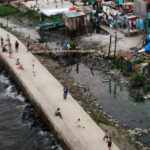
A comprehensive new United Nations-sponsored assessment of climate change finds that global warming is reshaping the world more rapidly and severely than was known several years ago.
Why it matters: The report finds that climate change is affecting every person’s physical and mental health, and classifies nearly half of the global population as being “highly vulnerable” to climate impacts.
Stay on top of the latest market trends and economic insights with Axios Markets. Subscribe for free
-
Importantly, the report — part of the biggest update to climate science findings since 2014 — concludes it is no longer possible to fully adapt to some global warming impacts.
-
It says irreversible losses are occurring among some warm water coral reefs, coastal wetlands and some rain forests.
-
The international authors of the report note that once ecosystems reach their hard limits, people will be directly affected as they lose the benefits these natural systems provide.
Driving the news: The report from the U.N. Intergovernmental Panel on Climate Change is the most thorough look yet at the impacts of climate change and how communities can best adapt to these changes.
-
It contains stark findings, including that warming is already contributing to humanitarian crises, and will increasingly imperil food security.
-
U.N. Secretary-General António Guterres described the report in a statement as an “Atlas of human suffering.”
-
“Nearly half of humanity is living in the danger zone — now. Many ecosystems are at the point of no return — now,” he said.
Zoom in: The report notes that we are past the point where “minor, marginal, reactive or incremental changes” will adequately prepare society for the climate impacts that are in store. Instead, it calls for larger-scale shifts “in most aspects of society” to reduce climate risks and enhance resilience, among other goals.
Yes, but: The report is not all doom and gloom. It repeatedly emphasizes that if society takes steps to limit warming to 1.5°C, it would prevent many, though not all, of the worst impacts.
-
However, even then, some changes may be irreversible — such as Arctic permafrost melt and glacier loss.
-
The report provides blueprints for possible adaptation strategies. For example, it says, residents of a coastal community could implement measures to combat sea level rise, ranging from an early warning system for flooding events to raising the height of roads and homes along the water’s edge.
Threat level: The new report clearly states that greater impacts of climate change will occur at lower levels of warming than previously thought, based in part on trends seen to date with just 1.1°C of warming since the preindustrial era.
-
Scientists are already seeing highly consequential extreme weather events and marine heat waves, along with entire species dying off on land and sea.
-
“1.1 degrees is way more dangerous than we thought it was,” Erin Coughlan de Perez, a senior adviser to the Red Cross Red Crescent Climate Center, told Axios.
The report finds that just as climate change has adversely affected physical health worldwide, it’s also taking a toll on mental health.
-
The mental health consequences are mainly coming from trauma related to extreme weather and climate events, such as wildfires, and loss of livelihoods and culture.
-
The report notes that poorer societies with less robust infrastructure have been suffering more than the rest of the world.
-
Between 2010 and 2020, the report found that deaths from floods, droughts and storms were 15 times higher in highly vulnerable regions — which tend to be in poorer, developing nations —compared to regions with very low vulnerability.
Between the lines: Emerging research in the report also warns against allowing warming to overshoot the 1.5°C temperature target that is baked into many of the scenarios for how the world shifts to clean energy.
-
Scenarios that quickly bring temperatures back down by rapidly and significantly cutting greenhouse gas emissions would be associated with lower risks of triggering irreversible impacts.
-
The report also warns of the possibility of speeding up global warming during overshoot by melting permafrost, which releases methane and carbon dioxide, further warming the planet.
-
“You pass 1.5 and you come back, you’ve lost things that you will never get back,” Coughlan de Perez said. Examples could include mountain glaciers, which are hard to stop melting once it begins.
-
Sarah Cooley, director of climate science at the Ocean Conservancy and a contributor to the IPCC report, said marine kelp forests are likely to die off during overshoot, and irreversible changes could occur in other marine ecosystems.
What they’re saying: According to Cooley, the typical reaction of the global community to IPCC reports, which come out every six or seven years, is to “hit the snooze button.”
-
“I think this report is when the parent screams up the stairs, “It’s time to get out of bed or you’re going to miss the bus,”” she told Axios. “We are really able to zero in now on the choices that are being foreclosed if we delay further.”
Like this article? Get more from Axios and subscribe to Axios Markets for free.




